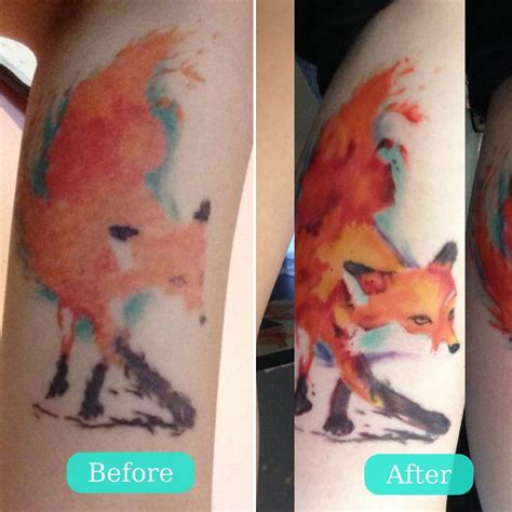The popularity of watercolor tattoos has exploded in recent years, but are they a wise investment? While these ethereal designs can be beautiful, they come with potential drawbacks that should be carefully considered before committing to one. This article will delve into the pros and cons of watercolor tattoos, ultimately exploring the question: “Are watercolor tattoos a bad idea?”
The Drawbacks of Watercolor Tattoos
Watercolor tattoos are inherently more prone to fading and blurring over time compared to traditional tattoos. Their soft, diffused nature makes them susceptible to the effects of UV rays and friction, which can cause the pigments to deteriorate and spread, compromising the original design. Additionally, watercolor tattoos often require touch-ups more frequently than other types of tattoos to maintain their vibrancy.

Another potential drawback is the limited color palette available for watercolor tattoos. While the watercolor effect creates a unique and ethereal look, it can also restrict the range of colors that can be used effectively. Artists may be limited to pastel hues and softer shades, which may not appeal to everyone. It’s important to discuss color options thoroughly with your tattoo artist to ensure satisfaction with the final result.
The Benefits of Watercolor Tattoos
Despite their potential drawbacks, watercolor tattoos offer unique advantages that make them appealing to many. Their soft, diffused appearance creates an ethereal and artistic effect that is unattainable with traditional tattoos. Watercolor tattoos can capture delicate details and subtle nuances, making them a popular choice for nature-inspired designs, abstract compositions, and portraits.
Additionally, watercolor tattoos can be less painful than traditional tattoos due to the use of softer needles and lighter pressure. The technique involves gently depositing pigment just beneath the skin’s surface, resulting in less trauma and discomfort. This makes watercolor tattoos a potentially viable option for those with a lower pain tolerance or who are new to the world of tattoos.
Conclusion
Whether watercolor tattoos are a bad idea ultimately depends on individual preferences, circumstances, and expectations. While they offer unique aesthetic advantages, their susceptibility to fading and the limited color palette should be carefully considered. Those who value the ethereal beauty and are willing to commit to regular touch-ups may find watercolor tattoos to be a great choice. However, for those seeking a more permanent and vibrant tattoo with a broader color range, traditional tattoo styles may be more suitable.
Ultimately, the best way to make an informed decision is to consult with a reputable tattoo artist who specializes in watercolor tattoos. They can provide valuable insights, discuss different design options, and help you determine if a watercolor tattoo is the right choice for you.
FAQ
Is it true that watercolor tattoos fade faster than traditional tattoos?
Yes, watercolor tattoos are generally more prone to fading over time due to their lighter pigmentation and diffused nature. UV rays and friction can cause the pigments to deteriorate and spread, compromising the original design.
Are watercolor tattoos more painful to get than traditional tattoos?
No, watercolor tattoos are typically less painful than traditional tattoos. The technique involves using softer needles and lighter pressure, resulting in less trauma and discomfort to the skin.
Can watercolor tattoos be covered up?
Yes, watercolor tattoos can be covered up with darker and more opaque tattoos. However, the original watercolor design may still be partially visible beneath the new tattoo.
Are watercolor tattoos suitable for all skin tones?
Yes, watercolor tattoos can be adapted to complement various skin tones. Artists can adjust the color intensity and saturation to create designs that flatter different skin undertones.
How long do watercolor tattoos last?
The longevity of watercolor tattoos varies depending on individual factors such as sun exposure, skin care routine, and touch-up frequency. With proper care, watercolor tattoos can last for several years, but they may require more frequent touch-ups to maintain their vibrancy.



